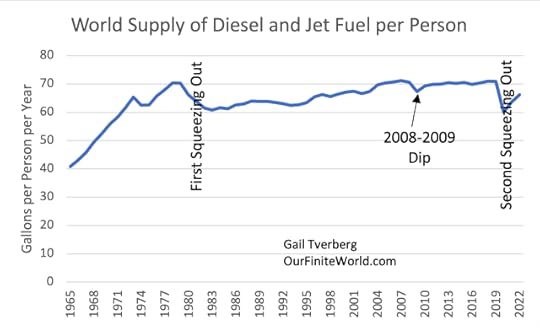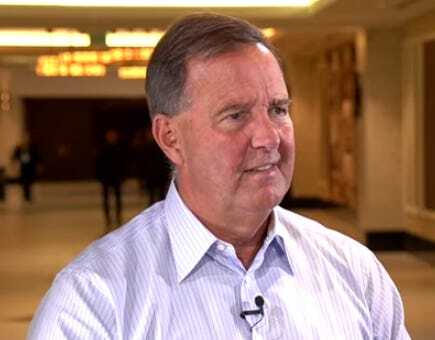Steve Bull's Blog, page 94
October 29, 2023
The Specter of Hyperinflation Looms over the Economy

The threat of hyperinflation has haunted fiat money economies throughout history. Although past empires crumbled under the weight of unrestrained money printing, modern bankers at the Federal Reserve assure us that today’s financial system is immune to such a fate. Austrian business cycle theory, however, reveals that current economic stimulation may be propelling us toward a crisis of catastrophic proportions: a crack-up boom that marks the dramatic end of this boom-and-bust cycle. When a central bank expands the money supply to reinflate bubbles, it destroys the currency’s purchasing power. This endgame, in which the monetary system crumbles beneath a weak economy, represents the ultimate failure of interventionism. Once the public expects prices to keep rising, hyperinflation becomes a self-fulfilling prophecy.
The Expanding Boom-and-Bust Cycle Ends in a Crack-Up BoomTo comprehend the precarious state of America’s monetary system, we must first review the boom-and-bust cycle as formulated by Ludwig von Mises and the Austrian school. The Austrians observed that the artificial suppression of interest rates by a central bank initiates an unsustainable economic boom by promoting malinvestment. Pushing rates below natural market levels sends a distorted signal to businesses that long-term capital investment is more profitable than the economy can actually support. In the euphoric boom phase, jobs multiply and GDP grows with investment. But the investments lack economic merit, so the house of cards eventually collapses.
With the liquidation of malinvestments, the bust phase emerges: unemployment soars, output contracts, and a recession begins. Since the investments were built on quicksand, they must unwind. Each failed business further curtails consumer spending, rippling the bust through the economy. But rather than letting liquidation and market corrections occur, policymakers add stimulus, setting up a larger bubble and more painful bust down the line.
…click on the above link to read the rest…
October 28, 2023
Newsguard Case Highlights the Pentagon’s Censorship End-Around
The Consortium News lawsuit against a private news rating system lays out how the government can suppress speech by proxy

Monday, the independent website Consortium News filed suit against the United States of America and Newsguard Technologies. The complaint targeting both the government and a private media ratings service is an important one, putting the censorship-by-proxy system on trial.
On September 7, 2021, the U.S. Department of Defense gave an award of $749,387 to Newsguard Technologies, a private service that scores media outlets on “reliability” and “trust.” According to the suit, roughly 40,000 subscribers buy Newsguard subscriptions, getting in return a system of “Nutrition Labels” supposedly emphasizing “safe” content. Importantly, Newsguard’s customers include universities and libraries, whose users are presented with labels warning you that CBS is great and Tucker Carlson is dangerous:

Consortium News was labeled a purveyor of “disinformation,” “misinformation,” and “false content,” and, worst of all, “anti-U.S.” This is despite the fact that, according to the suit, Newsguard only flagged six articles out of the tens of thousands Consortium News has published since the late award-winning reporter Robert Parry founded it in 1995. As Consortium News points out, Newsguard downgrades its entire 20,000+ library of available online articles with these flags based on the handful of edge cases, all of which involve criticism of U.S. foreign policy.
A particular irony is that Parry, a decorated AP and Newsweek reporter, founded Consortium News specifically to address topics suppressed by mainstream editors. Now Parry’s old site is being downgraded for dissenting reports on subjects like the 2014 Ukrainian coup and neo-Nazism in Ukraine, coincidentally topics that are “the subject of NewsGuard’s ‘Misinformation Fingerprints’ project that is under contract with the Cyber Command,” as the suit reads.
…click on the above link to read the rest…
Today’s Contemplation: Collapse Cometh CLVII–Overshoot, Hydrocarbon Energy, and Denial: Avoiding the Pain
 Mexico (1988). Photo by author.
Mexico (1988). Photo by author.Overshoot, Hydrocarbon Energy, and Denial: Avoiding the Pain
I share an ongoing conversation with others in my town of Stouffville regarding a post on a local Facebook Group discussing ongoing expansion of our suburban community. Note the common thinking along the lines of growth being a given and the energy blindness when discussing ‘development’, particularly in distant regions of our province.
The posted comment:
I’m concerned when I look around Main St. and see all these condos going up. We’ll be in constant gridlock. I do not see any potential to widen the road. Am I wrong? It’s going to be challenging at best to drive along Main St..
On the other hand, Stouffville also needs affordable housing.
My initial reply:
Perpetual growth on a planet with finite resources and fragile ecosystems…what could possibly go wrong?
MM:
Steve Bull well, if we sterilize every couple after having two children, and euthanize everyone once they reach the retirement age, we might be able to make the zero-population growth number work from an economic standpoint. Or cutting everyone off social assistance, and withdrawing healthcare insurance for the elderly might also work.
I think it might be a bit of a hard-sell, especially among those approaching their “golden years” and those who depend on government assistance to meet the costs of staying alive.
By the way the population density of Canada is less than 4 persons per square kilometre; are you at all familiar with population distribution of Canadians outside of the Golden Horseshoe?
MB:
MM, good thing you are not aging!
Me:
MM, It’s a wicked predicament that we’ve led ourselves into.
MM:
Steve Bull the die was cast when we decided that having public education, public healthcare, municipal services like police, fire & ambulance services, potable water supply and sewage service etc. were things that were desirable.
These things all cost money; and it is the nature of the human condition that we cannot each bear our share of these costs over the entirety of our life span, and that these costs fluctuate considerably over our lifetime.
This means that we have to rely on ever increasing numbers of working age members of our society to cover these costs. Or do we withdraw these services?
Me:
MM, The predicament is much deeper and complex than what you suggest. Look up what ecological overshoot is…and all our chasing of growth is simply exacerbating it.
JO:
MM, something I have often said, there is plenty of land for use outside he Golden Horseshoe. the problem is no one seems to want to develop it. Lots of land north of Parry Sound or even North Bay.
MM:
JO, Saskatchewan has a population density of 0.018 persons/ha. Manitoba is 0.025 persons/ha.
We need to do something to encourage employers to consider places like Regina & Saskatoon and Winnipeg & Brandon for new sites and not just the Golden Horseshoe.
TK:
JO, There wouldn’t be enough jobs to justify it and the land is rough and difficult to develop.
JO:
TK, unless you have personal experience of the area I would have to disagree with you. Having grown up there it has many attractions. It is not the easiest place to live but it is doable. Of course it is not for the faint of heart nor for pampered people.
MM:
MB, I wish that were true M, but I’m 3/4 home from the start to the end, and each year passes by more quickly than the year before.
MM:
Steve Bull, I am quite familiar with the concept of ecological overshoot; and I know that our calculations of regional and global carrying capacities have had to be reassessed countless times over the past 35 years that I have been a researcher and teacher of environmental science.
There is no reliable algorithm which can adequately predict changes in carrying capacity that can adequately make allowances for the unpredictable global climatic oscillations or the influence of developing resource technologies on net resource output.
The issue in Canada is the geographical concentration of the population, not the size of the population.
My final response:
MM, We will have to agree to disagree. I would argue Canada, and the entire planet, is already well into overshoot — I will assume you are familiar with Catton’s book on the subject and I don’t need to highlight his argument as to why this is so.
Simply because there is no perfect measure of overshoot or its changes does not negate the evidence that we are well into it, especially when one considers the finiteness of that most important resource to our continued expansion, and our societal complexities and their maintenance: hydrocarbons.
Virtually every aspect of the living standards of our modern, ‘advanced’ economies (and especially the ability to pursue expansionary policies the past century plus; particularly population, economic, geopolitical, and technological in nature) has been the result of surplus energy derived from hydrocarbon extraction and use. Of particular importance to current ‘modernity’ is diesel fuel that supports not only our long-distance supply chains but (with natural gas) industrial agriculture; both of which we have grown extensively dependent upon, particularly in Ontario where we import a good 80+% of our food needs for a growing population. (See Alice Friedemann’s work on this predicament, especially When Trucks Stop Running )
Of course, declining surplus energy due to significant diminishing returns as a result of our exponentially-expanding drawdown of this resource has led us to all sorts of machinations (especially economic and geopolitical — there’s a reason the Middle East is a quagmire and the world is awash in hundreds of trillions of dollars in debt and unfunded liabilities), along with magical thinking (i.e., ‘renewables’ can ‘power’ our complex societies and maintain our living standards and growth imperative), in our attempts to keep the party going and ignore the biophysical realities that exist. As some argue, we are extremely blind to our dependence/reliance upon the drawdown of hydrocarbon energy stores. (See Nate Hagen’s four-part series on this subject: Part 1 )
And all of this is being carried out with zero regard (apart from significant greenwashing narratives to keep selling ‘stuff’ and keep the masses in denial/ignorance) to the ecological systems destruction it is resulting in — there’s a reason some call our present geologic epoch the Sixth Mass Extinction.
So, yeah, we can ignore the elephant in the room of overshoot and believe in magic (especially infinite substitutability, particularly of energy) to convince us we can continue to chase the perpetual growth chalice when what we need to be discussing is how to degrow in a managed way before it is forced upon us by circumstances and Nature. Because, frankly, we aren’t going to enjoy the way in which Nature responds to our misuse of our planet in our attempts to grow well beyond physical limits. (Here I recommend watching the late Dr. Albert Bartlett’s presentation on the exponential function )
Extending our carrying capacity through the leveraging of a one-time and finite cache of photosynthetically-derived energy was always going to end badly — it’s put us neck deep into overshoot. However, instead of discussing this and its inevitable consequences we have manipulated our economic systems and weaved comforting stories to ignore its significant anxiety-provoking fallout — most (all?) of which are completely energy blind. It’s much easier to believe in comforting narratives than discuss means by which we might mitigate some of the coming storm.
Regardless of the overwhelming evidence of this misguided trajectory, my guess (based upon pre/historical precedents, the human tendency to deny anxiety-provoking thoughts, and the Maximum Power Principle) is that we will continue to bargain with/rationalise away the Laws of Thermodynamics and biophysical limits and wholeheartedly pursue growth rather than confront the looming energy cliff and all that portends.
Certainly those that profit from this path will encourage it (particularly through their mouthpieces of the government and mainstream media) and tell us comforting stories about our ingenuity and technological ability to ‘solve’ what is for all intents and purposes an insoluble predicament.
Growth, to infinity and beyond…
Of course, only time will tell how this all turns out, but certainly the signs are all there that we’re on the wrong path. With the inevitable decline in surplus energy we should be discussing how to reduce our dependency upon long-distance supply chains and how to relocalise everything but especially food production, potable water procurement, and shelter needs; not deliberating how best to continue expanding — particularly since this approach, while helping to support the Ponzi that is our financialized economic system, exacerbates our overshoot and worsens the eventual correction.
October 26, 2023
Today’s Contemplation: Collapse Cometh CLVI–Peak Oil, Complexity, Psychology, Magical Thinking, and War
 Mexico (1988). Photo by author.
Mexico (1988). Photo by author.Peak Oil, Complexity, Psychology, Magical Thinking, and War
Again, some sharing of my comments and others’ on a couple of recent FB Group posts.
First, a post from the Peak Oil Group I am a member of where some great conversations happen. In this particular situation, the comments were in response to my last Contemplation.
SH: I was with a group of technical people recently, engaged in conversation about a very wide range of issues, and when I pointed out that almost no one among engineers and entrepreneurs are striving to address future energy and resource needs, rather, the vast majority exhibit a myopic fixation toward devising increasingly complex ways to use up fossil hydrocarbons. Well… Some folks interrupted and pretty much drowned me out with a kind of “hear no evil” mantra, extolling the virtues of technology and human ingenuity. I don’t even think it was a conscious response, but a kind of unconscious impulse, an eruption of vocal energy resulting from cognitive dissonance. It seems apparent that humans are not psychologically equipped to handle large scale existential threats or crises. I guess what I’m suggesting is that it isn’t just elites who will kick the can down the road to maintain their status quo, but that pretty much everyone will respond to things like Peak Oil in a way that’s unquestionably irrational or egocentric in relation to the magnitude of the challenge. That’s my take on it anyway…
Me: SH, I completely agree. I suppose that’s one of the reasons I find the impact of our innate psychological mechanisms/processes so fascinating to explore and try to understand. I think a big part of our blindness to limits and the consequences of chasing the perpetual growth chalice is our ‘trust/faith’ in our various complex systems (and those who ‘control’ them). This has us engaging in significant magical thinking and believing that we can ‘adapt’ (via our technology and ingenuity) to the various predicaments we face. We cannot fathom that recent adaptations have run their course and we are on a dead-end trajectory. Psychology suggests our minds protect us from such anxiety-provoking thoughts regardless of the evidence to the contrary. It doesn’t matter what reality/facts/evidence demonstrates; it’s what we believe that rules.
PW: Steve Bull, Yes, extreme compartmentalism.
JR: Steve Bull, I started listening to a Derrick Jensen interview last night (suggested by a post here by Alice Friedman.) What I took from it is that it’s not human psychology in a vacuum. Different technologies have their own built-in ideologies that influence human ideologies. It was a bit esoteric, but it sort of made sense. Very interesting.
PW: JR, Yep, they have their religion, their science, their family, their whatever.
SH2: SH, what I’m wondering now is why is it possible (for governments, or anyone) to convince people en masse that it’s necessary to go off to war and likely be maimed and/or killed, and endure all the other hardships of war………… but it seems completely impossible (for governments, or anyone) to convince people en masse to put up with seemingly much milder forms of deprivation (like less luxurious lifestyles) in order to stave off collapse (and famine/death and eventually war leading to more famine, death, etc). ?
Me: SH2, The State profits from the war racket (and all the other growth rackets) but not economic contraction. They have no interest in convincing the masses to live more ‘sustainably’ since that would kill their golden geese.
SH2: Steve Bull, Agreed, but I think it must go deeper than that. Do soldiers signing up (not counting conscripts) not have any idea of what war is like? Assuming they do, why does the motive of sacrifice for the good of their society/country not apply in anywhere near the same level of commitment to non-war actions?
Me: SH2, It’s obviously very complex but perhaps part of it is the State’s ability to leverage our innate tribal instincts (i.e., sense of patriotism) and ramping up of the ‘othering’ that goes hand-in-hand with that, which influences a sense of ‘sacrifice for God and country’ that gets most to support war and the atrocities of it. When times are ‘tough’ there’s always some ‘other’ that can be dragged out to blame for things and our in-group versus out-group instincts drown out the critical aspects of such manipulations.
As for ‘sacrificing’ for the planet’s health and our long-term survival, these are minimised via the mainstream narratives about human ingenuity and technology being capable of countering such degradation, you know — we can ‘science’ our way out of any ‘problems’.
The forces of propaganda/marketing by the ruling elite are significant and impactful. They profit from war and from continued economic growth. They have zero interest in curtailing either of these insane and destructive pursuits and perhaps even less concern for our ecological systems — greenwashing everything to give the appearance of concern.
The ‘average’ person’s tendency to defer to authority/expertise leaves most following whatever trajectory a society’s ‘rulers’ set, and for the 10,000+ years of complex societies, these ‘influencers’ have prioritised that which sustains their revenue streams…war and expansion.
And to minimise the cognitive dissonance of the significant machinations and manipulations we are constantly exposed to, most go along to get along and parrot back the stories and help to cheerlead us over the impending cliff…
PW: Steve Bull, Very well stated Steve. I copied two sentences because of the clarity and preciseness of the logic. ……you know — we can ‘science’ our way out of any ‘problems.
PW: SH2, Part of it is the play on their testosterone, their need to be a hero outweighs many other considerations. I think that, yeah, they don’t know what they are doing.
PW: One play of the recruiters ‘they can sign up and join with their friends, they can all serve in the same unit. Well, no, as soon as they join they are split up with some never seeing their friends again. I watched one video of recruiters trying to sign some guys up and implying they could be like their favorite musical artist who had served in the military. They could join the musical military band like he did. The recruiters will lie about anything to get the signature on the line.
LM: SH, I’ve come across the same as this. Maybe it’s their fight mechanism in their brain. I suppose if you don’t know how to mitigate it with nature and low fuel consumption, you use the tools you think you have, even if you don’t really understand those tools. It’s laziness, ignorance and fear. Problem is, those responses adversely impact my daughters and their futures, along with all other children’s futures. So what are we to do? The only two ways to mitigate all this, infiltrate the political system or revolt against the existing system.
We don’t seem to be able to get past the leaders and elite. The ones that openly advertise that going back to a low fuel economy would take us back to the dark ages. Well yeah, maybe we’d have to go to bed the same time as birds mostly because of low fuel, there’s nothing dark about that, other than the dark night!
So so distant from nature. Crazy
Second, is this question/statement posed in the Degrowth Group I am a member of. I include it as it relates to issues raised above:
PJ: Do you think the worlds ‘elite’ might view climate change as being caused by having far too many slaves consuming ‘their’ planet’s resources? ( It seems strange how they really seem to be promoting world war three rather than attempting to promote peace) I bet most of them have their own nuclear bunkers. Do any of the worlds ‘leaders’ and elites actually see themselves as being ‘enemies’ or is it something they like to pretend to the people? To maintain their ‘system’ and their positions? They certainly like to keep telling us how other countries and people are our ‘enemies’.
Me: I don’t pretend to know what our ‘elite’ think or believe. I can only guess based upon some statements, their behaviours, and pre/historical evidence as to what others in their place seem to have done.
They don’t seem to agree on much and oftentimes disagree vehemently on things. This often makes them more concerned with their in-group and how to manipulate events amongst that restricted population as opposed to the masses. This is perhaps especially so across borders, and particularly with respect to regions rich in resources (mineral, labour, and capital).
They don’t appear to be overly concerned with the symptoms of ecological overshoot (anthropogenic climate impacts being one) except to leverage them in expanding their revenue streams and societal control mechanisms.
They appear to believe in the magical thinking weaved by ‘free’ market economists and infinite substitutability for declining resources, and that technology and human ingenuity can solve any pressing issue.
They do not appear to give two shits for the unwashed masses except as tax donkeys and labourers, but do attempt to appease them somewhat with bread, circuses, and soothing narratives (despite having the various protective services of private and public police/security/military, they do still fear reprisals from possible revolution by the masses — thus increasing mass surveillance and narrative management).
Perhaps they do fear a nuclear exchange, but many certainly (at least amongst the higher ups of the political and military classes, and possibly some other very influential individuals) have access to safe spaces where they believe they could avoid the worst of such an outcome.
But we need to also consider that war is a VERY profitable racket as Marine Corps Major General Smedley Butler reminded us. And THE primary motivation of these people probably since the beginning of complex societies 10,000+ years ago has been control and expansion of the wealth-generation/-extraction systems that provide their revenue streams and thus positions of power and prestige.
Again and again throughout human pre/history our ruling elite have sacrificed their citizens and the environment to meet this important motivation. I see little evidence that our current iteration of elite is any different than the many that have preceded them and expedited their society’s collapse, especially through overreach in many areas.
And when haven’t the weapons of the day ever sat idle once things have gone sideways?
Homo sapiens are very intelligent story-telling apes, just not very wise.
October 25, 2023
Today’s energy bottleneck may bring down major governments
Recently, I explained the key role played by diesel and jet fuel. In this post, I try to explain the energy bottleneck the world is facing because of an inadequate supply of these types of fuels, and the effects such a bottleneck may have. The world’s self-organizing economy tends to squeeze out what it considers non-essential parts when bottlenecks are hit. Strangely, it appears to me that some central governments may be squeezed out. Countries that are rich enough to have big pension programs for their citizens seem to be especially vulnerable to having their governments collapse.
 Figure 1. World supply of diesel and jet fuel per person, based on Middle Distillate data of the 2023 Statistical Review of World Energy, produced by the Energy Institute. Notes added by Gail Tverberg.
Figure 1. World supply of diesel and jet fuel per person, based on Middle Distillate data of the 2023 Statistical Review of World Energy, produced by the Energy Institute. Notes added by Gail Tverberg.This squeezing out of non-essential parts of the economy can happen by war, but it can also happen because of financial problems brought about by “not sufficient actual goods and services to go around.” An underlying problem is that governments can print money, but they cannot print the actual resources needed to produce finished goods and services. I think that in the current situation, a squeezing out for financial reasons, or because legislators can’t agree, is at least as likely as another world war.
For example, the US is having trouble electing a Speaker of the House of Representatives because legislators disagree about funding plans. I can imagine a long shutdown occurring because of this impasse. Perhaps not this time around, but sometime in the next few years, such a disagreement may lead to a permanent shutdown of the US central government, leaving the individual states on their own. Programs of the US central government, such as Social Security and Medicare, would likely disappear. It would be up to the individual states to sponsor whatever replacement programs they are able to afford.
…click on the above link to read the rest…
This “Unprecedented” Fiscal Doom Loop Is Getting Worse
Friend of Fringe Finance Lawrence Lepard released his most recent investor letter this week.
I believe Larry to truly be one of the muted voices that the investing community would be better off considering. He gets little coverage in the mainstream media, which, in my opinion, makes him someone worth listening to twice as closely.
Larry was kind enough to allow me to share his thoughts heading into Q4 2023. The letter has been edited ever-so-slightly for formatting, grammar and visuals.
OVERVIEW
It was an interesting quarter. There was a whiff of deflation as the Dow Jones, S&P 500 and NASDAQ all declined in value. But this was not matched by the prices of crude oil and commodities, both of which were strong, and the bond market had a bad quarter as rates continued to rise across the curve. A slowing economy, falling stocks and bonds, and rising commodity inflation spell one thing very clearly to us: STAGFLATION.
In the third quarter of 2023, the Fund increased in value slightly by 0.5% and picked up considerable ground (over 10% outperformance) on our benchmark index the Gold Stock Juniors ETF (GDXJ). A big piece of this outperformance occurred due to our large position in Lavras Gold which we profile on page 21. As we have said before, we manage the Fund aggressively, and in bear markets for gold stocks, we expect that we will do worse than GDXJ. However, we also want to point out that the converse is true in bull markets; in 2019 EMA was up 98% vs. the GDXJ which was up 40%, and in 2020 EMA was up 122% vs. the GDXJ which was up 33%. We believe that when this market turns, the results will be similar.
…click on the above link to read the rest…
Today’s Contemplation: Collapse Cometh XXV–More Greenwashing: ‘Sustainable’ Development
 Tulum, Mexico (1986) Photo by author
Tulum, Mexico (1986) Photo by authorMore Greenwashing: ‘Sustainable’ Development
This contemplation was prompted by an article regarding an ‘independent’ think tank’s report that presented the argument that government funding of the oil and gas industry needed to be shifted towards ‘green/clean’ alternatives. I’ve included a few hyperlinks to sites that expand upon the concepts/issues discussed.
Context, it’s always important. This ‘independent’ think tank, the International Institute for Sustainable Development, is part and parcel of the corporate/business ‘greenwashing’ of our world and ‘solutions’ to its various dilemmas. It’s primary mission is ‘sustainable’ development/growth, a gargantuan oxymoron on a finite planet. Infinite growth. Finite planet. What could possibly go wrong?
In fact, the perpetuation of this continued pursuit of perpetual growth is seen quite clearly in the absence of any discussion about curtailing our growth but rather finding ways to ‘sustain’ it, and the misuse of language (that has become endemic in the environmental movement) and the simplified ‘solution’ offered by arguing that government funds need to be directed away from the climate change-causing oil and gas industry and towards the ‘clean’ energy alternatives of ‘renewables’.
Left out of this discussion to shift funds to what the think tank argues is more ‘sustainable’ (and one has to wonder how much funding is derived for the think tank’s activities from individuals and businesses seeking to profit from increased funding for widespread adoption of alternative energy) is the increasing evidence that ‘green’ alternatives to fossil fuels are neither ‘green’ (because of their ongoing dependence on fossil fuels and environmentally-destructive upstream industrial processes and downstream waste disposal issues) nor actually ‘renewable’ (because of their ongoing dependence upon finite resources, especially fossil fuels and rare-earth minerals). These are, of course, quite inconvenient facts regarding all energy sources: they are ecologically destructive and depend upon finite resources. The only source that is truly ‘renewable’ is biomass but it would be required in such massive quantities for our current world population and global complexities that it must be considered finite and environmentally problematic.
Nowhere is the non-mainstream idea of degrowth proposed. Instead, we are led to believe that business as usual (continued growth) is entirely feasible and infinitely sustainable by adjusting where our resources in terms of money and labour are directed: away from the oil and gas industry and towards energy alternatives. Devastating climate change will then be averted (as well as all the other negative consequences of exploiting and using fossil fuels) and life can continue uninterrupted as we all live happily ever after.
Until and unless we confront the very idea of continued growth and, in almost all cases, reverse this trend there is zero chance of us stopping, let alone mitigating, the various existential dilemmas we have created as a consequence of our expansion and its concomitant exploitation of finite resources. I believe it’s fair to argue we have significantly overshot the planet’s natural environmental carrying capacity, have blown past several important biophysical limits that exist on a finite planet, and have just the collapse that always accompanies such situations to experience in the future.
Many will continue to deny this predicament we find ourselves in. They will firmly believe in the comforting and cognitive dissonance-reducing narratives that individuals and groups, like the International Institute for Sustainable Development, are leveraging to direct resources to particular industries. This is quite normal for anyone beginning to grieve a significant loss which is what we are facing: the imminent demise of our globalised, industrial world and its many complexities and conveniences. We (particularly those in so-called ‘advanced’ economies that consume the vast majority of finite resources and rely upon the exploitative industries that leverage these resources to create the many conveniences to feed and house us) would rather believe in fantasies, myths, and fairy tales than recognise and confront the impending challenges of a life without most (all?) of our complex and energy-intensive tools.
Life without these conveniences is fast approaching it would appear. We have encountered diminishing returns on our investments in such complexities. We have soiled vast regions of our planet with the waste products of our expansion and exploitive endeavours. We have very likely reached a peak in global complexity and will begin our reversion to the norm of much more simplified ways.
Some of the negative consequences of our expansion and increasing complexity have been acknowledged. Instead of slowing our march towards the cliff ahead, however, the vast majority (all?) of our ‘ruling class’ (whose primary motivation, I would argue, is the control and expansion of the wealth-generating systems that provide their revenue streams), as they so often (always?) do is leverage the increasingly obvious crises to enrich themselves. They use narrative control mechanisms (particularly their influence over the mainstream media and governments) to craft stories extolling solutions and salvation that not only preserve their revenue streams but expand them in a kind of final blow off top of resource extraction and use; ignoring, of course, the environmental fallout of this.
The more obvious ‘solution’ of reversing the growth imperative is avoided at all costs. Marketing ‘sustainable’ growth via ‘green/clean’ energy alternatives is preferred. Humanity cannot only have its cake and eat it, but it can do so in a vastly improved world of technological wizardry and infinite improvements. Ignore that pesky fact about living on a finite planet over there, it’s a distraction from our ingenuity and creativity. Do not raise skepticism about our ability to overcome challenges. Life is much more happily viewed from inside the Matrix.
October 24, 2023
Today’s Contemplation: Collapse Cometh XXIV–Climate Change and Narratives to Support Continued Economic Growth
 Tulum, Mexico (1986) Photo by author
Tulum, Mexico (1986) Photo by authorClimate Change and Narratives to Support Continued Economic Growth
The following commentary was once again prompted by an online media article, this one discussing the necessary paradigm shift required to confront the existential dilemma of climate change, particularly how we view our relationship with nature and the use of financial capital to expand our exploitive ways.
This article does a good job of highlighting one of the various complexities of the issue(s) involved in addressing our various existential dilemmas and the fact that there is no single panacea for humanity’s predicaments. It’s an interlinked combination of aspects that flow from humanity’s relatively long-time interaction with and exploitation of our natural environment. And how we view our relationship with nature is fundamental to better addressing the consequences of our current relationship but I believe it goes beyond how we tend to use ‘capital’ to exploit our world since humanity’s exploitive ways have carried on for millennia; long before ‘capitalism’ became a thing.
I would add to this partial story that it involves not just financial capital but our more ‘recent’ tendency to increasingly: expand our population, seek ever-improved living standards for a burgeoning population, create useful and then overly rely upon ‘technology’ to expand our exploitation of the natural world, urbanise more and more space at the expense of food-producing lands, depend upon ‘marginal’ lands to sustain us, and concentrate dependence upon finite resources that have encountered diminishing returns on our investments in them. These patterns of behaviour, however, are incongruent with existence on a finite planet regardless of the economic system used to pursue them. Even a far more ‘equitable’ one would likely result in a similar outcome at some point. Humans have not, for millennia, lived ‘sustainably’ with our world.
But since our behaviour does not align with the biophysical realities of finite resources to support them, we go about creating comforting narratives to reduce the resulting cognitive dissonance that arises. As animals with complex cognitive abilities and self-awareness, we cannot hold such conflicting belief systems without significant psychological stress being created so we seek confirmation that one of them is wrong and the other is correct. Rather than confront the more ‘depressing’ story that our ways are completely unsustainable and must be abandoned, we weave stories that appear on the surface to be more ‘acceptable’ to our current lifestyles and belief systems, and then look for evidence to support them; ‘facts’ being irrelevant. We refuse to acknowledge the counterevidence to our belief system. We deny. We get angry. We bargain with ‘what ifs’ and ‘if onlys’. We construct a reality that we prefer, exorcising the one we don’t from our minds.
While it’s commonplace among some to point fingers at our current global economic system, such overexploitation and eventual negative consequences have been with human complex societies for millennia — long before ‘capitalism’ emerged. Our ‘ingenuity’, as it were, has allowed human societies to expand their footprint repeatedly throughout our pre/history and in my opinion it’s going to take more than a paradigm shift to balance our species’ impact/exploitation with that of the environment. Paradigm shifts take time. They begin on the margins and then they rely on a tipping point of participants to be convinced by the evidence that their current worldview conflicts with the data and a new paradigm better explains the phenomena being observed and experienced.
And here’s the rub. Humans are wonderful at creating stories. We have the ability to convince ourselves and others that our senses are lying to us. What you are witnessing is not what you think it is. It is something else entirely. Add on top of this the fact that we are social animals and think and believe in herds, and that there exist powerful psychological mechanisms that steer our thinking and beliefs. We are often convinced of things that are not true, that 2 plus 2 doesn’t equal 4 but 5. And our thinking can be manipulated in many different ways, and oftentimes without our even having the foggiest idea that this is happening.
So, if it’s in the best interests of the powers-that-be/ruling class/elite/social power structures to have the masses believe in a particular storyline, we can be fairly certain that the narrative(s) we are exposed to align with it and we consequently convince ourselves it is correct and arose from the ‘evidence’; it’s what all ‘right-thinking’ people believe and if you or others believe differently then it’s you that is wrong — believing otherwise is dysfunctional. We see this playing out repeatedly in both the mainstream and social media platforms on a variety of fronts. But we also want to believe in happy endings, that we have agency to alter significantly the future, that there is hope, that if we put our minds to it we can accomplish any and everything, and that we are an ingenious species that can control not just our local environment but nature itself and the future. And this seems especially true in ‘advanced’ economies that exploit our world far, far, far more than so-called ‘emerging’ ones and rely so much more on finite resources for their functioning and perpetuation.
Chasing the perpetual growth chalice is currently being kept alive through such narratives as the Build Back Better, Green New Deal, and Great Reset storylines. These attempt to convince us if we ‘electrify’ everything or expand using ‘net-zero’ approaches we can continue to exploit the world at our leisure, and do so in a way that addresses climate change and ‘saves’ us all. But these stories avoid the obvious hurdles and roadblocks. They ignore the biophysical limits that exist on a finite planet. They discount the thermodynamic realities that restrict such policies. They depend very much on unproven or significantly uneconomical technologies (i.e., they take more energy/resources than they provide back). But it is likely we will continue to chase these ‘solutions’ for they offer us salvation and prolonging of the status quo. We do not like uncertainty and do not embrace change.
Who wouldn’t want to keep the party going especially with its many conveniences and obvious ‘benefits’ for those reaping the ‘rewards’? Life without these wonderful things would be a lot more work and less certain. Without the complex support systems we have created and depend upon, most of us would be in certain dire straits — to say the least.
Perhaps most glaringly we have lost our skills/knowledge to live/survive self-sufficiently but instead depend entirely upon complex and fragile systems (especially long-distance supply chains) over which we have zero control and so seek to find ways to convince ourselves that there are somewhat easy ‘solutions’. We have created a financial/economic/monetary system that necessitates chasing the perpetual growth chalice but since infinite growth is impossible on a finite planet we have leveraged debt and Ponzi-type structures to continue the party for a bit longer. We have pushed biophysical limits into dangerous territory while allowing ourselves to believe it can last forever, and a day. We have overshot our natural environmental carrying capacity and encountered increasingly problematic diminishing returns on our investments in complexity and like so many complex societies before us have begun the decline/fall/collapse that always follows.
Given all of this, I am increasingly coming to believe that regardless of our understanding of our dilemmas we will fail to address them in a way that would differ from complex societies of the past. We will continue to pursue growth and attempts to prolong such growth for as long as we can, damn the consequences. We will, for the most part, continue to believe biophysical limits do not, well, limit us. We will continue to tell ourselves and believe the comforting narratives our ‘leaders’ will tell us. We will continue to cling to faulty paradigms and rarely, if ever, admit the crumbling social structure (and physical structures) around us is anything but the ‘fault’ of those who didn’t believe in our ingenuity and inventiveness; to say little about the fact that the rich and powerful marketing these fantasies stand to become even richer and more powerful as we pursue them. It’s a final blow-off top of ‘growth’ before the eventual collapse that always accompanies a species overshooting its natural environmental carrying capacity.
‘Collapse’ is in all likelihood inevitable — I state ‘all likelihood’ since not one of us can accurately predict the future but from my perspective the evidence pre/history provides us with is overwhelming. It cannot be avoided but will be denied well beyond its in-your-face obviousness.
I close with quotes from two ‘experts’ on the issue of societal ‘collapse’. First, archaeologist Joseph Tainter from his 1988 text The Collapse of Complex Societies: “However much we like to think of ourselves as something special in world history, in fact industrial societies are subject to the same principles that caused earlier societies to collapse. If civilization collapses again, it will be from failure to take advantage of the current reprieve, a reprieve both detrimental and essential to our anticipated future.” And this from Jared Diamond’s 2005 text Collapse: How Societies Choose to Fail or Succeed: “Those past collapses tended to follow somewhat similar courses constituting variations on a theme. Population growth forced people to adopt intensified means of agricultural production…Unsustainable practices led to environmental damage…Consequences for society included food shortages, starvation, wars among too many people fighting for too few resources, and overthrows of governing elites by disillusioned masses. Eventually, population decreased through starvation, war, or disease and society lost some of the political, economic, and cultural complexity that it had developed at its peak.”
Today’s Contemplation: Collapse Cometh XXIII–‘Clean Energy’ and the Stages of Grieving
 Tulum, Mexico (1986) Photo by author
Tulum, Mexico (1986) Photo by author‘Clean Energy’ and the Stages of Grieving
Today’s thought was motivated by another Tyee article that carries on the notion of ‘clean energy’ and the ‘magical thinking’ needed to buy into such narratives.
As long as language is being manipulated (e.g., ‘clean energy’ is a gargantuan oxymoron), magical thinking employed (e.g., ‘green hydrogen’ or some iteration of it has been on the books for 2+ centuries and is still far, far away, if ever, given the physical and economic hurdles/roadblocks), and fundamental causes of our dilemmas conveniently ignored (e.g., our pursuit of the infinite growth chalice on a finite planet), the ‘solutions’ we so desperately seek will always elude us (if they even exist).
Despite relatively general recognition of humanity’s impending ‘challenges’, we continue to follow the ‘Business-As-Usual’ (BAU) scenario painted for us by Meadows et al. in their 1972 Limits to Growth. Our ‘leaders’ talk a good talk but the reality (given the obvious lack of ‘progress’ in mitigating our issues and their increasingly probable negative consequences) is that we have painted ourselves into a corner from which we apparently cannot extricate ourselves (except through some very convoluted narrative creations).
There is overwhelming and increasing evidence that there is a significant reckoning in terms of energy decline (and various other resources) in our future, regardless of our wishes, ingenuity, and technology. The complexities of our globalised, just-in-time, and highly resource-dependent industrialised societies are losing their support systems in terms of the resources they require. We have encountered significant diminishing returns on our investments and can no longer ‘afford’ them. All the talk of ‘solutions’ is, at this point, seemingly reflective of the first four stages of grief outlined by Kubler-Ross: denial, anger, bargaining, and depression.
We are very keen on avoiding the final acceptance stage. Instead, we listen and accept faulty narratives about how this will all work out just fine. We create and propagate misleading phrases like ‘clean energy’ and ‘net zero emissions’ which are primarily marketing slogans. We allow ourselves to believe in ‘promising’ technological ‘fixes’ that require us to ignore or dismiss the constraints and physical impossibilities that are involved. And perhaps the worst of all, we look the other way when our ‘leadership’ completely ‘jumps the shark’ and whispers in our ears that we indeed can pursue ‘sustainable growth’ (a phrase that totally twists the concept of sustainability and ignores the biophysical constraints of a finite planet) and live, for the most part, happily-ever-after.
Such a fairy tale ending is indeed possible, but only in our imaginations. The momentum of our complex systems and the reality of a finite world straining under the exploitation of cognitively ‘advanced’ walking-talking apes are taking us down a path that is best described by William Catton Jr. in Overshoot: a species that overshoots its environmental carrying capacity is destined to encounter a population ‘collapse’ and any response that increases the drawdown of the fundamental resources upon which the species is reliant only speeds up the process. And this seems very much to be exactly what we are doing as we ‘debate’ ways in which to sustain our living standards and most of our energy-reliant and -intensive sociocultural practices.
Our best option may be to, in the words of author and social commentator John Michael Greer, “Collapse Now and Avoid the Rush”. Degrowth is coming. We can have some say in how this occurs but the longer we delay (and we’re very, very good at delaying our encounters with ‘reality’), the less ‘control’ we will have in meeting the coming challenges.
My suggestion is to detach from the ‘Matrix’ as much as possible by relocalising production of necessary goods but particularly shelter needs and organic and regenerative food production, and ensure the procurement of potable water. The government/politicians/ruling elite are not coming to the rescue; that is not their primary concern despite everything they say. The way in which they have met these challenges (that have been known for a number of decades) is evidence of that. We have continued to follow the BAU path set out in 1972 and simply managed to put ourselves further and further behind the eight ball. It’s perhaps no exaggeration to suggest that the planet burns while our ‘leaders’ are fiddling. Rely on yourself, family, and like-minded community members; not some politician promising more of the same actions that brought us to where we are.
Israel A ‘Nuclear Wildcard’ On ‘Dangerous Road To Armageddon’: Macgregor
Tucker Carlson sat down with Col. Douglas Macgregor (ret.), who laid out a disturbing scenario in which the United States could quickly be pulled into a direct conflict with Iran, Russia and China over Israel’s anticipated response to the October 7 Hamas attack.
Carlson starts off highlighting Lindsey Graham, who vowed; “…if Hezbollah, which is a proxy of Iran, launches a massive attack on Israel, I consider that a threat to the… state of Israel, existential in nature. I will introduce a resolution [in] the United States Senate to allow military action by the United States in conjunction with Israel to knock Iran out of the Oil Business…”
Carlson then asks: “So what would war with Iran mean? Well, it’s hard to know because virtually no one who’s talking about it in public is operating from a deep interest in America’s interest. Is this good for us, or is it not?”
If, as Sen. Graham suggests, we start bombing critical infrastructure in Iran, Macgregor warns “the destruction would be wholesale” as Iran would target “all the bases we have in Iraq and Syria – with around 1000 Americans – would be targeted… and this time accurately.“According to Macgregor, “The chosen destination” if we continue on this path, “is Armageddon,” and the implications (of which nobody seems to be considering) for the United States, Europe, and the Middle East are grave. For example, “just on the economic side, about 20% of the world’s oil passes through the Straits of Hormuz every month – probably 25% of liquefied natural gas, and you’re talking about shutting down 2 to three million barrels a day of oil from Iran.
“You know this entire region is involved in the war. This is not an Iranian Monopoly by any stretch of the imagination,” he continued.
…click on the above link to read the rest…





